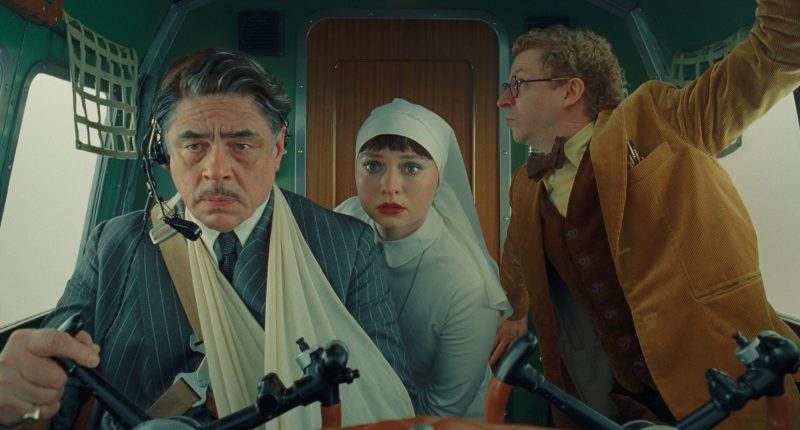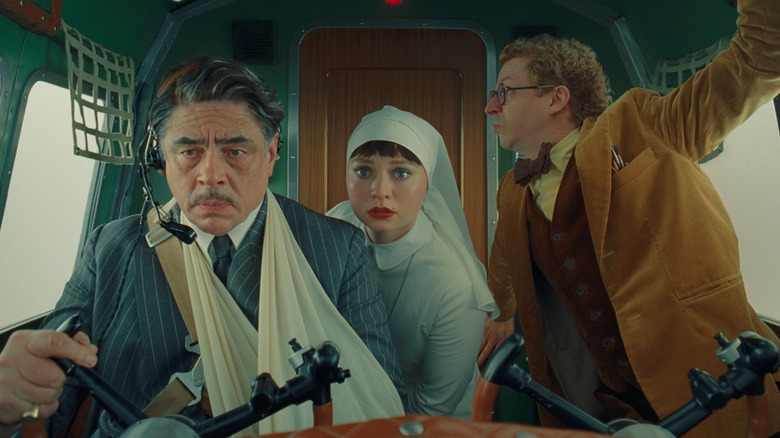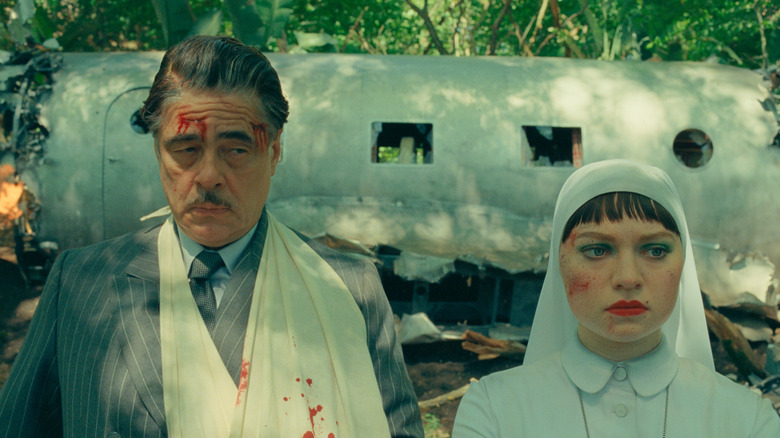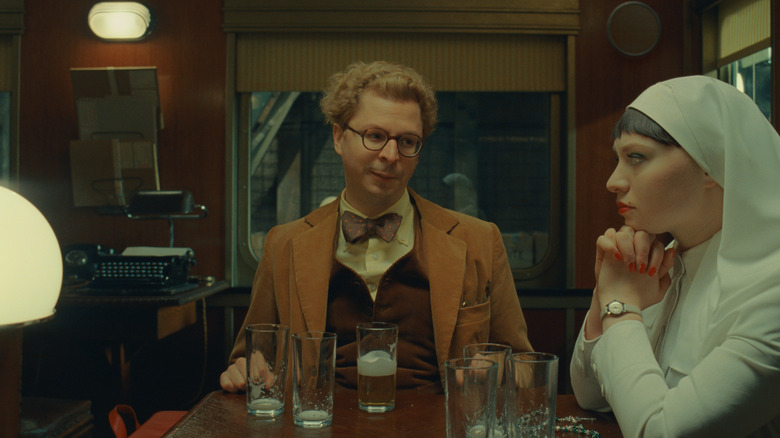Share this @internewscast.com
RATING : 8 / 10
- Solid dysfunctional family story addressing capitalism and religion
- Relative straightforwardness helps the comedy shine
- Wes Anderson’s usual aesthetic perfection
- Not Anderson’s best movie, and won’t convert his haters
The common trend with Wes Anderson films is that each one tends to become increasingly more quintessentially ‘Wes Anderson’ as time goes on. Whether one sees this as positive or negative is a personal decision for every film enthusiast. In my view, Anderson’s artistic prowess truly flourished with his exploration into stop-motion animation in 2009’s “Fantastic Mr. Fox.” I appreciate how he has infused that elevated and animated style into his subsequent live-action creations. In my opinion, 2014’s “The Grand Budapest Hotel” marks his most outstanding piece of work.
However, Anderson sometimes loses me when his complex ideas become too intricate. I felt underwhelmed by “The French Dispatch,” where he attempted to convert 3.5 tributes to New Yorker articles into a cinematic form. “Asteroid City” had its shining moments, yet overall, it was a perplexing blend of a movie that’s also a play, a TV documentary, and reminiscent of a bi-monthly curated snack box (the last element is a nod to a “BoJack Horseman” quip involving Quentin Tarantulino, yet one could imagine Anderson actually creating such a film).
“The Phoenician Scheme” furthers the development of Anderson’s charming diorama style while simplifying the elaborate structural ideas. It features Anderson’s most straightforward narrative since possibly 2012’s “Moonrise Kingdom.” While the string of eccentric plot points might appear overwhelming on paper, it shouldn’t be of concern. The most outlandish details primarily serve comedic purposes, and the core thematic and emotional elements remain consistently clear. It’s another of Anderson’s tales of a dysfunctional family, focused and poignant, revolving around the relationship between Zsa-zsa Korda (Benicio del Toro), a father attempting to determine if he can turn over a new leaf; and Sister Liesl (Mia Threapleton — daughter of Kate Winslet), a daughter assessing the value of family.
Wes Anderson’s first villain protagonist
Zsa-zsa Korda is objectively the most evil character Wes Anderson has ever centered a movie around. He’s a weapons-dealing, famine-causing, slavery-supporting oligarch who rejects his own human rights and profits from every side of any given conflict. He’s wanted in pretty much every country (his big crime against the United States is not paying tariffs, a joke that’s aged like fine wine). If he was a real person, you’d hate him. But as the fast-talking, larger-than-life Wes Anderson equivalent of Tony Stark in the first “Iron Man?” He’s fun to watch, both for the audacity of how he makes it out of countless life-threatening situations and for the way his brushes with mortality begin to stir in him something of a conscience.
“The Phoenician Scheme” opens on Zsa-zsa’s sixth plane crash, a gleeful spectacle of comical violence that avoids true gruesomeness on the basis of Anderson’s hyper-fake special effects. Before he gets up and packs some loose organs back into his belly, Zsa-zsa experiences a vision of his own funeral in an eerie black-and-white Heaven (you might wish to avoid spoilers for which Anderson regulars make cameos here). This close call with death inspires him to reconnect with his daughter Liesl, a nun who despises everything he stands for and suspects he killed her mother, but who agrees to test out serving as his heir. Liesl joins her father, along with his entomology tutor Bjørn (Michael Cera, stealing scenes with the best-worst Euro-accent ever), to seek out funding for the titular scheme, an elaborate construction project in the Middle East for which Zsa-zsa promises all slaves will be paid.
Zsa-zsa’s prospective benefactors include a prince (Riz Ahmed), some basketball-playing brothers (Tom Hanks and Bryan Cranston), a nightclub owner (Mathieu Amalric), a shipping magnate (Jeffrey Wright), a kibbutznik (Scarlet Johansson), and Zsa-zsa’s even more evil brother (Benedict Cumberbatch). These supporting characters and others are eccentrically entertaining as any the filmmaker’s assembled, but “The Phoenician Scheme” is less ensemble-focused than other Anderson pics. Its success, beyond the mid-century hipster “Looney Tunes” spectacle of it all, rests on how well Benicio del Toro and Mia Threapleton play off each other and how their characters push each other to evolve. Zsa-zsa picks up concepts of Christian morality from his daughter, while remaining complicated; he’s neither fully redeemed nor condemned. Liesl, meanwhile, reluctantly finds herself appreciating her dad’s taste in finery despite the ascetic impulse to reject it. It’s the director offering a defense of his own opulence.
Beautiful style with approachable substance
“The Phoenician Scheme” is an expertly crafted film in all the ways you expect from Wes Anderson. It’s a Rube Goldberg machine of deadpan comedy, moving at a rapid speed with the closest thing to an action movie script Anderson has written. Everything from the sets to the costumes to the cinematography is impossibly perfect, each little classic art homage and funny piece of text in its proper place. The tension-building score mixes Igor Stravinsky with original pieces by Alexandre Desplat.
How substantial is the movie beyond its surface pleasures? On first impression, I’d say it’s substantial enough. Maybe it’s not Wes Anderson’s deepest film, and it’s not his best, but I still found it compelling as a character study and relationship piece with a curiosity about politics and spirituality. Its approachable heart heightens the appeal of the expected surface pleasures, making this the most I’ve enjoyed an Anderson film since 2018’s “Isle of Dogs.”
Before a second viewing, I’d be very interested to read more on the film from experts on Middle Eastern history. There’s obviously some satire going on here about the West’s history of meddling in the region, though Anderson forgoes explicit statements in favor of more general playful observation. There’s an intriguing ideological messiness to a story wherein uber-capitalists, communist terrorists, and a moderate conservative masquerading as a bohemian all find common cause with one another. The movie is dedicated to Anderson’s late father-in-law Fouad Mikhael Maalouf, who was born in the West Bank of Palestine and became something of a Korda-esque titan of industry in Lebanon. A deep dive into that personal connection to the material might yield greater depths than initially perceived.
“The Phoenician Scheme” opens in limited release on May 30 and in wide release on June 6.











